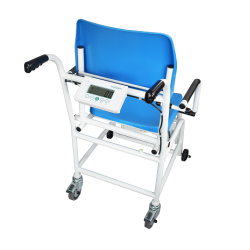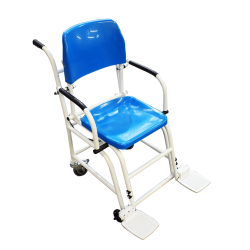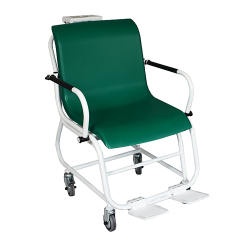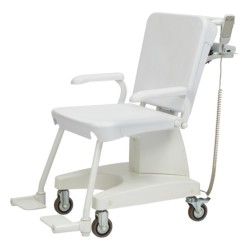Medical Chair Scales
There are 4 products.
Active filters
About Medical Chair Scales
Safe Seated Weighing for Patients with Mobility Limitations
Medical chair scales provide essential weighing solutions for patients unable to stand safely on conventional floor scales, serving hospitals, care homes, rehabilitation facilities, and clinics throughout England, Scotland, Wales, and Northern Ireland. These specialised weighing devices integrate weighing mechanisms into comfortable seating, enabling accurate weight measurement for individuals with mobility limitations, balance difficulties, lower limb weakness, or conditions preventing safe standing. Healthcare environments rely on medical chair scales for weighing elderly patients with reduced mobility, individuals recovering from surgery or illness affecting standing ability, patients with neurological conditions causing balance problems, wheelchair users requiring alternative weighing methods, and bariatric patients needing secure seated weighing. Modern medical chair scales incorporate features including fold-down armrests facilitating easier transfers, stable chair construction providing secure patient positioning, accurate weighing systems meeting medical standards, and appropriate weight capacities accommodating varied patient sizes. The provision of chair scales ensures inclusive weighing capability across patient populations, prevents discrimination by disability through accessible measurement methods, and supports patient safety by eliminating risks associated with attempting standing weighs for unstable patients across professional healthcare environments.
The implementation of medical chair scales directly supports CQC compliance through accessible patient care, safety enhancement during weighing procedures, and demonstration of appropriate equipment provision meeting diverse patient needs. Healthcare organisations serving patients with mobility limitations face challenges when standing scales represent the only available weighing method, potentially excluding vulnerable patients from regular weight monitoring or causing safety risks through attempted standing for unstable individuals. Medical chair scales address these challenges by providing safe seated weighing eliminating fall risks, enabling weight monitoring for previously difficult-to-weigh patients, supporting dignified care through comfortable weighing experiences, and delivering accurate measurements comparable to standing scales. Clinical benefits include regular weight monitoring detecting changes indicating clinical deterioration, appropriate medication dosing through accurate weights, nutritional assessment supporting dietary interventions, and fluid balance management critical for cardiac or renal patients. Healthcare organisations benefit from reduced weighing-related incidents when appropriate scales are provided matching patient capabilities, improved data capture when all patients can be safely weighed, and enhanced patient satisfaction through dignified, accessible care delivery. Modern medical chair scales incorporate safety features including secure armrests preventing falls, stable bases resisting tipping, and comfortable seating dimensions accommodating varied patient sizes throughout England, Scotland, Wales, and Northern Ireland.
Selecting and implementing medical chair scales requires assessment of patient populations, appropriate equipment specification, and integration with clinical weighing protocols across healthcare facilities throughout the UK. Organisations should evaluate the proportion of patients requiring seated weighing, determining whether chair scales represent occasional needs justifying shared equipment or frequent requirements necessitating dedicated scales in each area. Equipment selection should prioritise appropriate weight capacity typically 250-300kg for general use and higher for bariatric applications, comfortable seating dimensions accommodating varied patient sizes, fold-down armrests enabling easier transfers, and accurate weighing mechanisms meeting medical device standards. Implementation protocols must encompass staff training on safe patient transfers to chair scales, correct scale operation including tare functions and position procedures, and documentation of weights in patient records. Quality assurance measures should include regular calibration maintaining accuracy, documented maintenance records, cleaning protocols preventing cross-contamination, and monitoring of weighing-related incidents. Modern medical chair scales incorporate features such as integrated printers providing weight records, battery operation enabling mobility without power constraints, and antimicrobial upholstery supporting infection control. Organisations should establish clinical protocols identifying which patients require chair scale weighing, standardise weighing procedures across staff, and determine appropriate weighing frequencies. Clinical teams should consider patients with specific needs including bariatric patients requiring higher capacity chair scales, very tall or short individuals needing appropriate seating dimensions, and anxious patients requiring gentle communication during transfers. Storage considerations should enable convenient access encouraging regular use whilst protecting equipment from damage. By maintaining appropriate medical chair scales and implementing professional weighing protocols, healthcare organisations throughout England, Scotland, Wales, and Northern Ireland demonstrate their commitment to CQC standards, accessible patient care, safety during clinical procedures, and the provision of inclusive equipment that enables accurate weight monitoring for all patients regardless of mobility limitations, supporting evidence-based clinical care and person-centred approaches across diverse patient populations.




